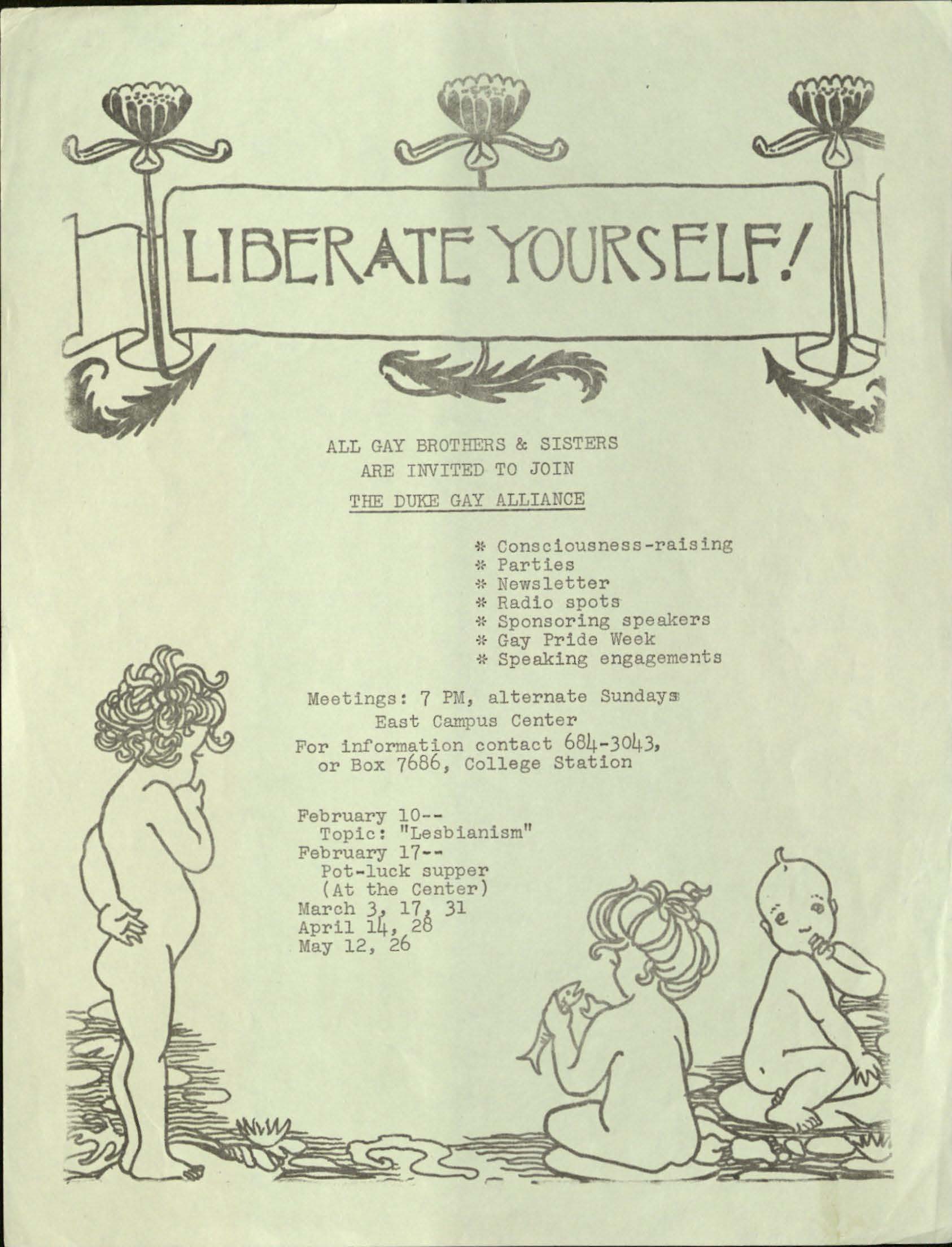Duke’s LGBTQIA+ history is rich and varied, but documentation, especially of earlier decades, can be scant in the University Archives. The experiences of students, faculty and staff in decades past were often not documented and sometimes actively hidden due to homophobia and discrimination. Therefore, when we do find perspectives of an earlier time, it’s a treasure. The Gay Morning Star, Duke’s first LGBTQIA+ publication of any kind, is one of those treasures. This once-a-semester newsletter was published by the Duke Gay Alliance between 1973 and 1975.
The Gay Alliance, Duke’s first openly queer student group, was recognized and chartered by the student government in the fall of 1972. The Chronicle reported on Nov. 15 that “When a motion was made to charter Duke’s gay alliance, laughter broke out among the representatives. ‘The reaction of this crowd shows that it is damn well time for this group to be organized,’ [Dave] Audet [T’73; off campus legislator] said in support of the charter. It was approved unanimously.”
The next day, an unsigned editorial in the Chroniclecriticized the conditions in which gay students endured at Duke. The students wrote, “In order to adjust to a hostile social community, a gay must continually masquerade as straight, or at least as non-sexual (‘I’m just not interested in chasing after girls right now.’) He must suppress his reactions to wisecracks made at the expense of homosexuals … We are not defending homosexuality. Homosexuality needs no defense. It is a reality as concrete as heterosexuality. We affirm the validity of our lives. A homosexual is as capable of a productive and meaningful life as a straight person, when his right to live his own life is recognized.”
“It is no more possible to stereotype Gays than it is to stereotype, say, all registered voters. On the contrary, we exist in all walks of life, all professions, with a full spectrum of social, political, and economic ideas, and a wide range of lifestyles.”
– The Gay morning star
The Gay Morning Star included a mix of editorials, information about meetings and resources, poetry, and scholarly writing. In the first issue in spring 1973, the opening article is titled “WHO ARE WE?”
“We live on your floor in the dorm. We eat with you. We play Frisbee with you. We get high with you. We are women and men who believe it is beautiful to express love and affection and friendship rather than repress it due to fear of stereotyped and outmoded notions of sexuality, masculinity, and femininity.
“Gay people are individuals, not a category. No single generalization about the nature of Gay people can be applied to all Gay people. It is no more possible to stereotype Gays than it is to stereotype, say, all registered voters. On the contrary, we exist in all walks of life, all professions, with a full spectrum of social, political, and economic ideas, and a wide range of lifestyles.”
The article stated that the Gay Alliance was founded for two reasons – to “provide a home and support for the Gay community at Duke” and to “make our resources available to educate the entire Duke and area community on Gay issues: to demystify Gayness, to refute the persistent myths and explain the new Gay consciousness, and to allow everyone to understand and respect Gay Pride.” In this first issue, no names are attached to the contents within, aside from a poem and quote by Walt Whitman.
In November 1973, the second issue came out, and some of the articles included names or initials. The articles described the difficulty of being openly gay at Duke. Most of the articles in the first two issues appear to be written by men. By the third issue in the spring of 1974, the challenges faced by women were noted: “During the past year, the DGA has encountered a problem of unity faced by many gay groups the country over. Many gay women are finding that they derive greater sustenance – both as homosexuals and as women – in the feminist movement than in ‘gay liberation’ as initially organized by men. As a result, many of the women in DGA have preferred to transfer their allegiance and their political energies to local Lesbian-feminist groups. Other women have felt an obligation to continue their active support of DGA.” This was followed by two articles by women on the lesbian-feminist movement, which was active in Durham.
In the spring of 1975, the Gay Morning Starreported that “The first gay dance in the triangle area was jointly sponsored by the DGA and the Carolina Gay Alliance in the Duke Graduate Center on April 4. Our thanks to the straights and gays – well over 200-strong – who helped make the event a great success.” It also announced that “Duke President Terry Sanford has agreed to meet with members of the Duke Gay Alliance on April 17 to discuss the question of extending Duke’s Equal Opportunity Policy to cover gay employees.”
Today, Duke commits to non-discrimination of students, faculty and staff of all sexual and gender identities, and the Center for Sexual and Gender Diversity (CSGD) provides a space where queer Dukies can gather. Earlier this year, the Duke University Libraries dedicated the Janie K. Long Study Space, named for a former director of the CSGD. Fifty years ago, it was students themselves who created new spaces to talk about sexuality and gay liberation. The Gay Morning Star, although published for only a few years, serves as a testament to their efforts to make Duke a more inclusive place.
